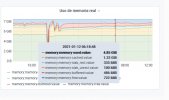Hi,
I´m a little confuse with memory uses, my server have very high Memory use but have very low process, ¿is it a normal situation?
Server config:
Ubuntu Ubuntu 18.04.5 LTS
Maria 1:10.2.36+maria~bionic
Php-fpm 7.3
2 cores
8 ram
1 site wordpress
1 site magento 2.3.6
My.cnf:
I´m a little confuse with memory uses, my server have very high Memory use but have very low process, ¿is it a normal situation?
Server config:
Ubuntu Ubuntu 18.04.5 LTS
Maria 1:10.2.36+maria~bionic
Php-fpm 7.3
2 cores
8 ram
1 site wordpress
1 site magento 2.3.6
My.cnf:
Code:
# MariaDB database server configuration file.
#
# You can copy this file to one of:
# - "/etc/mysql/my.cnf" to set global options,
# - "~/.my.cnf" to set user-specific options.
#
# One can use all long options that the program supports.
# Run program with --help to get a list of available options and with
# --print-defaults to see which it would actually understand and use.
#
# For explanations see
# http://dev.mysql.com/doc/mysql/en/server-system-variables.html
# This will be passed to all mysql clients
# It has been reported that passwords should be enclosed with ticks/quotes
# escpecially if they contain "#" chars...
# Remember to edit /etc/mysql/debian.cnf when changing the socket location.
[client]
port = 3306
socket = /var/run/mysqld/mysqld.sock
# Here is entries for some specific programs
# The following values assume you have at least 32M ram
# This was formally known as [safe_mysqld]. Both versions are currently parsed.
[mysqld_safe]
socket = /var/run/mysqld/mysqld.sock
nice = 0
[mysqld]
sql_mode=ERROR_FOR_DIVISION_BY_ZERO,NO_AUTO_CREATE_USER,NO_ENGINE_SUBSTITUTION
bind-address = ::ffff:127.0.0.1
local-infile=0
skip-name-resolve
#
# * Basic Settings
#
user = mysql
pid-file = /var/run/mysqld/mysqld.pid
socket = /var/run/mysqld/mysqld.sock
port = 3306
basedir = /usr
datadir = /var/lib/mysql
tmpdir = /tmp
lc_messages_dir = /usr/share/mysql
lc_messages = en_US
skip-external-locking
#
# Instead of skip-networking the default is now to listen only on
# localhost which is more compatible and is not less secure.
#
# * Fine Tuning
#
max_connections = 100
connect_timeout = 5
wait_timeout = 31536000
max_allowed_packet = 32M
thread_cache_size = 128
#sort_buffer_size = 4M Ajustado
bulk_insert_buffer_size = 16M
tmp_table_size = 32M
max_heap_table_size = 32M
table_definition_cache = -1
join_buffer_size = 256K
#
# * MyISAM
#
# This replaces the startup script and checks MyISAM tables if needed
# the first time they are touched. On error, make copy and try a repair.
myisam_recover_options = BACKUP
key_buffer_size = 128M
#open-files-limit = 2000
table_open_cache = 64
myisam_sort_buffer_size = 512M
concurrent_insert = 2
#read_buffer_size = 2M Ajustado
#read_rnd_buffer_size = 1M Ajustado
#
# * Query Cache Configuration
#
# Cache only tiny result sets, so we can fit more in the query cache.
query_cache_limit = 128K
query_cache_size = 0
# for more write intensive setups, set to DEMAND or OFF
query_cache_type = 0
#
# * Logging and Replication
#
# Both location gets rotated by the cronjob.
# Be aware that this log type is a performance killer.
# As of 5.1 you can enable the log at runtime!
#general_log_file = /var/log/mysql/mysql.log
#general_log = 1
#
# Error logging goes to syslog due to /etc/mysql/conf.d/mysqld_safe_syslog.cnf.
log_error = /var/log/mysql/mariadb-error.log
# we do want to know about network errors and such
log_warnings = 2
#
# Enable the slow query log to see queries with especially long duration
#slow_query_log[={0|1}]
#slow_query_log_file = /var/log/mysql/mariadb-slow.log
long_query_time = 10
#log_slow_rate_limit = 1000
log_slow_verbosity = query_plan
#log-queries-not-using-indexes
#log_slow_admin_statements
#
# The following can be used as easy to replay backup logs or for replication.
# note: if you are setting up a replication slave, see README.Debian about
# other settings you may need to change.
#server-id = 1
#report_host = master1
#auto_increment_increment = 2
#auto_increment_offset = 1
#log_bin = /var/log/mysql/mariadb-bin
log_bin_index = /var/log/mysql/mariadb-bin.index
# not fab for performance, but safer
#sync_binlog = 1
#expire_logs_days = 10
#max_binlog_size = 100M
# slaves
#relay_log = /var/log/mysql/relay-bin
#relay_log_index = /var/log/mysql/relay-bin.index
#relay_log_info_file = /var/log/mysql/relay-bin.info
#log_slave_updates
#read_only
#
# If applications support it, this stricter sql_mode prevents some
# mistakes like inserting invalid dates etc.
#sql_mode = NO_ENGINE_SUBSTITUTION,TRADITIONAL
#
# * InnoDB
#
# InnoDB is enabled by default with a 10MB datafile in /var/lib/mysql/.
# Read the manual for more InnoDB related options. There are many!
default_storage_engine = InnoDB
innodb_buffer_pool_size = 4G
innodb_buffer_pool_instances = 4
innodb_log_buffer_size = 8M
innodb_file_per_table = 1
innodb_open_files = 400
innodb_io_capacity = 400
innodb_flush_method = O_DIRECT
innodb_log_file_size = 512M
#
# * Security Features
#
# Read the manual, too, if you want chroot!
# chroot = /var/lib/mysql/
#
# For generating SSL certificates I recommend the OpenSSL GUI "tinyca".
#
# ssl-ca=/etc/mysql/cacert.pem
# ssl-cert=/etc/mysql/server-cert.pem
# ssl-key=/etc/mysql/server-key.pem
#
# * Galera-related settings
#
[galera]
# Mandatory settings
#wsrep_on=ON
#wsrep_provider=
#wsrep_cluster_address=
#binlog_format=row
#default_storage_engine=InnoDB
#innodb_autoinc_lock_mode=2
#
# Allow server to accept connections on all interfaces.
#
#bind-address=0.0.0.0
#
# Optional setting
#wsrep_slave_threads=1
#innodb_flush_log_at_trx_commit=0
[mysqldump]
quick
quote-names
max_allowed_packet = 32M
[mysql]
#no-auto-rehash # faster start of mysql but no tab completion
[isamchk]
key_buffer = 16M
#
# * IMPORTANT: Additional settings that can override those from this file!
# The files must end with '.cnf', otherwise they'll be ignored.
#
!includedir /etc/mysql/conf.d/



